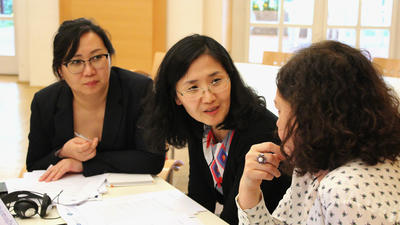-
Our work
-
Fields of work
- Arms control
- Border management
- Combating trafficking in human beings
- Conflict prevention and resolution
- Countering terrorism
- Cyber/ICT Security
- Democratization
- Economic activities
- Education
- Elections
- Environmental activities
- Gender equality
- Good governance
- Human rights
- Media freedom and development
- Migration
- National minority issues
- Policing
- Reform and co-operation in the security sector
- Roma and Sinti
- Rule of law
- Tolerance and non-discrimination
- Youth
- Field operations
- Projects
-
Meetings and conferences
- Summit meetings
- Review Conferences
- Ministerial Council meetings
- Plenary meetings of the Permanent Council
- Plenary Meetings of the Forum for Security Co-operation
- Security Review Conferences
- Annual Implementation Assessment Meetings
- Economic and Environmental Forum
- Economic and Environmental Dimension Implementation Meetings
- Human rights meetings
- Media conferences
- Cyber/ICT security conferences
- Conference of the Alliance against Trafficking in Persons
- Gender equality conferences
- Annual OSCE Mediterranean conferences
- Annual OSCE Asian conferences
- Partnerships
-
Fields of work
-
Countries
- All
-
Participating States
- Albania
- Andorra
- Armenia
- Austria
- Azerbaijan
- Belgium
- Belarus
- Bosnia and Herzegovina
- Bulgaria
- Canada
- Croatia
- Cyprus
- Czechia
- Denmark
- Estonia
- Finland
- France
- Georgia
- Germany
- Greece
- Holy See
- Hungary
- Iceland
- Ireland
- Italy
- Kazakhstan
- Kyrgyzstan
- Latvia
- Liechtenstein
- Lithuania
- Luxembourg
- Malta
- Moldova
- Monaco
- Mongolia
- Montenegro
- The Netherlands
- North Macedonia
- Norway
- Poland
- Portugal
- Romania
- Russian Federation
- San Marino
- Serbia
- Slovakia
- Slovenia
- Spain
- Sweden
- Switzerland – OSCE Chairpersonship 2026
- Tajikistan
- Türkiye
- Turkmenistan
- Ukraine
- United Kingdom
- United States of America
- Uzbekistan
- Asian Partners for Co-operation
- Mediterranean Partners for Co-operation
-
Structures and institutions
- Chairpersonship
-
Secretariat
- Secretary General
- Office of the Secretary General
- Conflict Prevention Centre
- Transnational Threats Department
- Office of the Special Representative and Co-ordinator for Combating Trafficking in Human Beings
- Office of the Co-ordinator of OSCE Economic and Environmental Activities
- Gender Issues Programme
- Opportunities for Youth
- Department of Human Resources
- Department of Management and Finance
- Office of Internal Oversight
- Documentation Centre in Prague
- Institutions
-
Field operations
- Presence in Albania
- Centre in Ashgabat
- Programme Office in Astana
- Programme Office in Bishkek
- Mission to Bosnia and Herzegovina
- Programme Office in Dushanbe
- Mission in Kosovo
- Mission to Moldova
- Mission to Montenegro
- Mission to Serbia
- Mission to Skopje
- Project Co-ordinator in Uzbekistan
- Closed field activities
- Parliamentary Assembly
- Court of Conciliation and Arbitration
- Organizational structure
- About us
News Item
Women, Peace and Security Agenda under scrutiny at OSCE-supported workshop in Vienna
Government and civil society representatives from Andorra, Kazakhstan, Mongolia, Turkey, Turkmenistan and Slovakia gathered for the third OSCE National Action Plan Academy workshop on 19 and 20 April 2018 in Vienna to discuss good practices in the implementation of United Nations Security Council Resolution (UNSCR) 1325 on Women, Peace and Security.

- Issued on:
- Issued by:
- OSCE Secretariat
- Fields of work:
- Gender equality
Government and civil society representatives from Andorra, Kazakhstan, Mongolia, Turkey, Turkmenistan and Slovakia gathered for the third OSCE National Action Plan Academy workshop on 19 and 20 April 2018 in Vienna to discuss good practices in the implementation of United Nations Security Council Resolution (UNSCR) 1325 on Women, Peace and Security.
The workshop was opened by the OSCE Special Representative and Co-ordinator for Combating Trafficking in Human Beings, Madina Jarbussynova. “As the 20th anniversary of UNSCR 1325 is just two years away, it is a good time to take stock of what has been achieved so far. Many steps have already been taken to advance the role of women in the prevention and resolution of conflicts, but we have to acknowledge that much more work needs to be done under all four pillars of the Women, Peace and Security Agenda,” she said.
Swanee Hunt, head of the NGONGO
non-governmental organization Inclusive Security, urged the participants to keep in mind that Women, Peace and Security is not a so-called women’s issue but a human security issue. “Bringing women to peace negotiation tables and peace operations will make societies safer for all,” she said.
The participants brainstormed on how a National Action Plan on Women, Peace and Security could result in concrete and realistic outcomes. Instead of listing different activities to be conducted, a National Action Plan should be structured around results expected to be achieved within the time period covered by the plan, participants agreed.
The workshop also compared the strengths and weaknesses of different models of co-ordination for drafting and implementing a National Action Plan.
“The OSCE, with its comprehensive approach to security and its mandate that covers the whole conflict cycle, is well placed to lead work on Women, Peace and Security,” said the workshop facilitator Miki Jacevic. “The OSCE region, where more than half of the countries have already adopted National Action Plans, can be a good example to other regions where there more work still to be done.”
Two previous National Action Plan Academy workshops were organized in 2016 and 2017, respectively. So far, 130 government and civil society representatives from 25 OSCE participating States have benefited from these workshops.